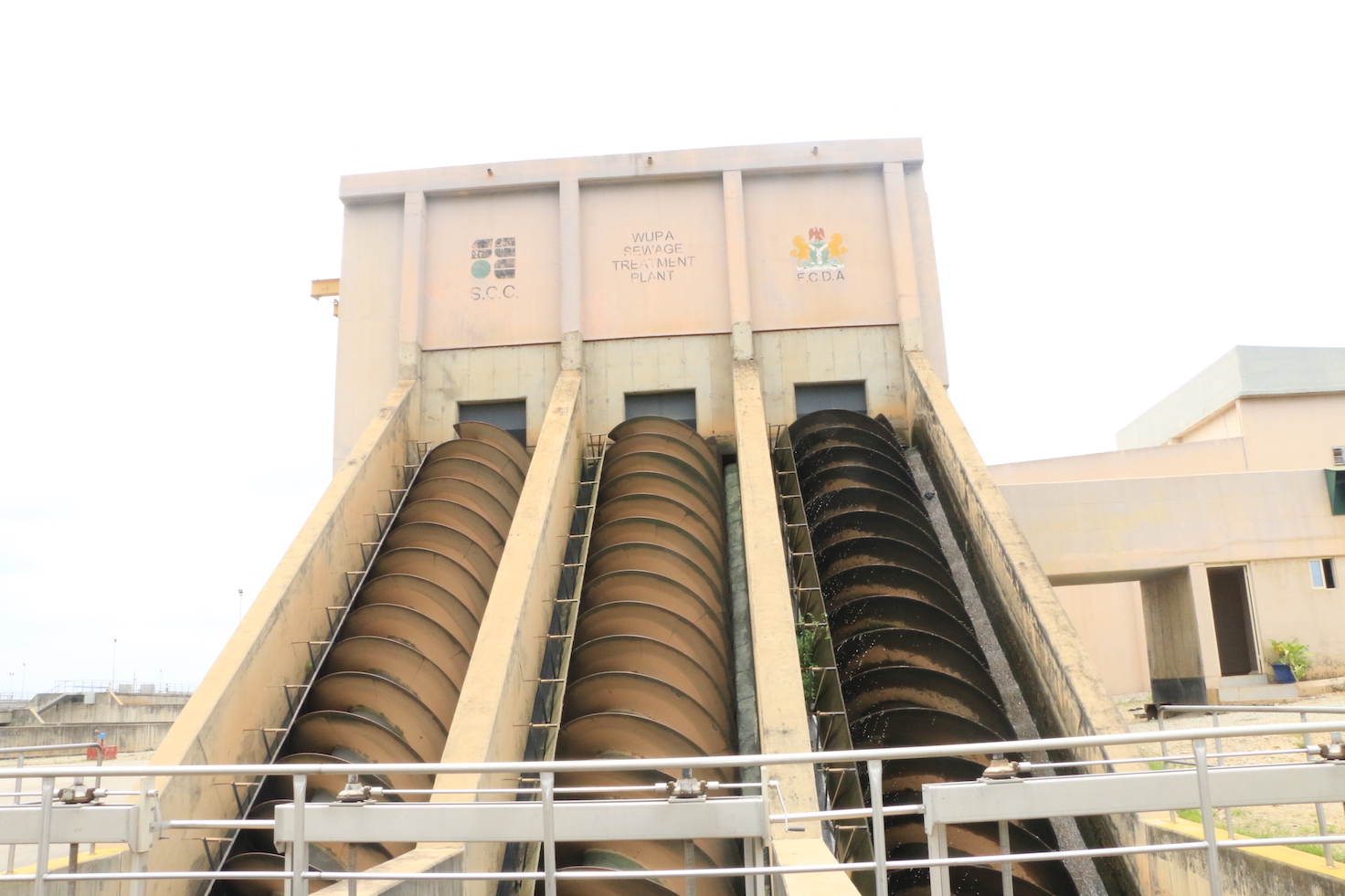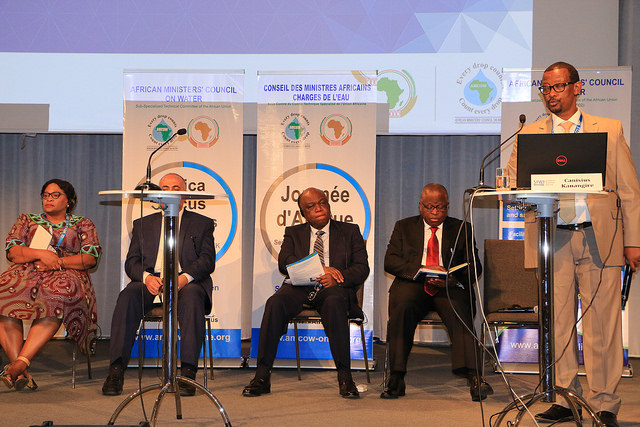
By Atayi Babs
African Water and Sanitation Ministers attending the 2017 World Water Week in Stockholm, Sweden have underlined the importance of wastewater to the region’s aspirations for economic growth and sustainable development.
Speaking before and during today’s opening plenary in Central Stockholm, water and sanitation minsters from the five sub-regions in Africa were unanimous in their resolve to adopt and promote effective wastewater management across Africa.
According to them, improved wastewater management is not only critical to achieving the Africa Water Vision 2025 and the Sustainable Development Goal on clean water and sanitation (SDG 6), but also to other goals of the 2030 Agenda for Sustainable Development.
In an address to over 3,100 delegates at the annual water event in Stockholm, Engr. Gerson Lwenge, the Tanzanian minister for Water and Irrigation and President of the African Ministers’ Council on Water (AMCOW), recalled that African Ministers responsible for sanitation took proactive steps before the end of the MDGs era in 2015 by adopting the N’gor Declaration with a commitment that Africa will “progressively eliminate untreated waste by encouraging its productive use.”
Of equal importance to this commitment according to Engr. Lwenge, is “the fact that to actualize the potentials of turning waste to benefits, Africa needs to create the right policy environment and move from policy to effective implementation.”
“It is on this basis that the High Level Ministerial Panel at this year’s Africa Focus Sessions will explore possibilities of using science to enrich policy making and increase policy implementation efficiency,” the AMCOW president added.
The Senegalese Hydraulic and Sanitation Minister, Mansour Faye disclosed that this year’s World Water Week and by extension the Africa Focus Sessions, will provide a global platform for him and his colleague Ministers to “discuss policy options and enabling factors that support the adaption and implementation of innovative wastewater management approaches and technologies as well as draw recommendations on how African states can move from waste to benefits.”
To Dr. Mohamed Abdel Atty, the Egyptian Water and Irrigation Minister and AMCOW Vice President for North Africa, AMCOW’s commitment to achieving an Africa where there is equitable and sustainable use and management of water resources for poverty alleviation and socio-economic development, regional cooperation and the environment remains unwavering.
“With improved wastewater management particularly in the industrial and agricultural sectors, Africa will be on the firm path to food security and sustainable development” Dr Atty said.
Speaking on behalf of Water and Sanitation Ministers from Southern Africa region at the World Water Week, Mrs Jabulile Mashwama, Kingdom of Swaziland’s Minister for Natural Resources and Energy and AMCOW Vice President (Southern Africa), this year’s world water week provides an opportunity for Africa Ministers “to highlight the vision and aspirations of the water and sanitation community and stakeholders; share evidence and perspectives, as well as policy options on enabling factors that support the adoption and implementation of innovative wastewater approaches.”
From Central Africa region came the voice of caution as Léopold Mboli Fatran, Central African Republic Minister for Water, Mines and Energy and AMCOW Vice President for Central Africa underlined the fact that the quest to turn waste to benefits requires maximizing the resource recovery and reuse potentials in both sewered and non-sewered systems.
“If this is not well managed and supported by both government and development partners, the prospects of polluting the eco system, compromising water quality and undermining safe sanitation and hygiene won’t be ruled out” Fatran added.
AMCOW’s Executive Secretary, Dr. Canisius Kanangire agrees with the Central African Minister as faecal sludge and wastewater continually pose threats to human livelihood especially in African cities experiencing population growth due to rural to urban migration.
According to Dr. Kanangire, experiences by AMCOW member states show that wastewater can be a resource for irrigation with basic treatment and proper hygiene practices; sludge can be used as a source of energy, and fertilizers. “The productive use of waste water can generate income, development of micro enterprise and employment, as well as contribute to urban food and energy security. The threat therefore could be turned into opportunities for poverty alleviation” Kanangire says.
Wastewater: the untapped resource
The 2017 UN World Water Development Report states that most human activities that use water produce wastewater. As the overall demand for water grows, the quantity of wastewater produced and its overall pollution load are continuously increasing worldwide.
Over 80% of the world’s wastewater and over 95% in some least developed countries is released to the environment without treatment.
The report which dubs wastewater as the “untapped resource” observed that once it is discharged into water bodies, wastewater is either diluted, transported downstream or infiltrates into aquifers, where it can affect the quality (and therefore the availability) of freshwater supplies.
The ultimate destination of wastewater discharged into rivers and lakes is often the ocean with negative consequences for the marine environment. However, with improved and innovative management, wastewater can generate social, environmental and economic benefits essential for sustainable development.
AMCOW and the World Water Week
Established since 2002, the African Ministers’ Council on Water (AMCOW) brings together Water and Sanitation ministers from 55 African countries to promote cooperation, security, social and economic development and poverty eradication among member states through the effective management of the continent’s water resources and provision of water.
As Technical Committee for Water and Sanitation of the African Union, AMCOW contributes to Africa’s progress towards sustainable growth and development by providing political leadership in the continent’s efforts at achieving effective and efficient management of water resources through the provision of adequate and equitable access to safe water and sanitation
The World Water Week is the annual focal point for the globe’s water issues. Organised by the Stockholm International Water Institute (SIWI), the event brings together experts, practitioners, decision-makers, business innovators and young professionals from a range of sectors and countries to network, exchange ideas, foster new thinking and develop solutions to the most pressing water-related challenges of today.
This year’s theme “water and waste: reduce and reuse” reinforces SIWI’s belief in the relevance of water to global prosperity and the attainment of a water wise world.












